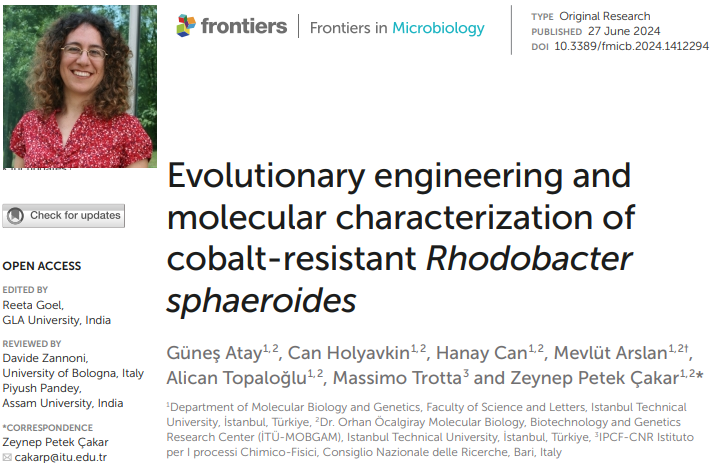Prof. Dr. Zeynep Petek Çakar's research group at ITU has been successfully improving resistance of microbial cells to various industrial stress types. For this purpose, the research group has been employing the highly effective inverse metabolic engineering approach known as adaptive laboratory evolution or evolutionary engineering. The stress responses and resistance exhibited by microbial cells during the evolutionary engineering process alter their typical physiological behavior. It is imperative to identify the metabolic and molecular differences between the original and evolved microbial cells to develop microorganisms that exhibit improved characteristics relevant to industrial applications.
In this recent international collaborative study resulting from the COST Action CM0902 (with Dr. Massimo Trotta from IPCF-CNR Bari, Italy) published by the prestigious international journal Frontiers in Microbiology (a Q1 journal according to Scopus index), Prof. Çakar’s group and her collaborators developed a cobalt-resistant Rhodobacter sphaeroides strain by evolutionary engineering and characterized the evolved strain at the genomic and physiological levels.
R. sphaeroides is an important photosynthetic purple non-sulfur bacterium, as it has a high adaptation ability that allows it to grow in diverse nutritional and environmental conditions, including heavy-metal-polluted environments. R. sphaeroides is able to fix CO2 and N2, and produce H2 and polyhydroxybutyrate (PHB). It has a significant biotechnological potential regarding bio-based production of chemicals and fuels and bioremediation. Cobalt is an industrially important element with magnetic properties and a variety of applications, including refining of alloys, production of gas turbines, jet engines, electrochemical materials and permanent magnets as well as its use in the cathodes of lithium-ions batteries of highly demanded electric vehicles, to tackle the global warming issue. However, as a transition metal, cobalt is toxic to living organisms at high concentrations. The highly cobalt-resistant and genetically stable evolved R. sphaeroides strain developed in this study was unaffected from toxic levels of cobalt, and higher levels of cobalt ions were associated with the evolved strain than the reference strain. This may imply that cobalt ions accumulated in or on the evolved strain, indicating the potential of the evolved strain for cobalt bioremediation. Whole genome sequencing of the evolved strain identified 23 single nucleotide polymorphisms in various genes that are associated with transcriptional regulators, NifB family-FeMo cofactor biosynthesis, putative virulence factors, TRAP-T family transporter, sodium/proton antiporter, and also in genes with unknown functions, which may have a potential role in the cobalt resistance of R. sphaeroides.
For further information:
https://doi.org/10.3389/fmicb.2024.1412294
Atay, G., Holyavkin, C., Kamer Can, H., Arslan, M., Topaloglu, A., Trotta, M. and Çakar, Z.P., Evolutionary engineering and molecular characterization of cobalt-resistant Rhodobacter sphaeroides. Frontiers in Microbiology, 15, 1412294.
